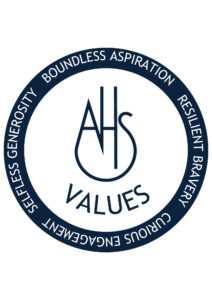AHS Ethos – Strategy and Implementation
Vision:Developing uniquely talented young adults, who are independent, strong and confident. Mission:A girls’ grammar school creating a welcoming environment which draws the very best from all in our community. Achieved by providing an ambitious education that stimulates creative and critical thinking, values diversity and facilitates dynamic personal development. Values:Through the curricular and co-curricular activities we nurture and develop these core values through all of our community: Boundless aspiration We’re looking for big ideas and bright futures, underpinned with ambition, rigour and respect for your environment. Walk tall and never lose sight of where you’re headed. Resilient bravery In trying to get it right, sometimes you’re going to get it wrong. It’s never the end of the world. Have confidence that you will learn from it and come back stronger. Fully commit to what you’re doing, aspire to achieve a little bit more than you thought you could. Curious engagement We live in a dynamic world of variety, diversity and change. Enjoy and engage with respect. Be curious, don’t settle with what you know now. Look to embrace difference, seek out alternative points of view, open yourself up to new ways of thinking. Selfless generosity By fostering an inclusive and compassionate community, we prioritise teamwork, valuing others, and kindness. Through collaboration and unity, be empowered to grow personally and academically. |
|
To view the whole document click here.
The AHS Values Learning Journey:
To see how the AHS Values are celebrated is subject areas visit the individual pages in Subjects.
How the AHS and British Values work together at AHS:





